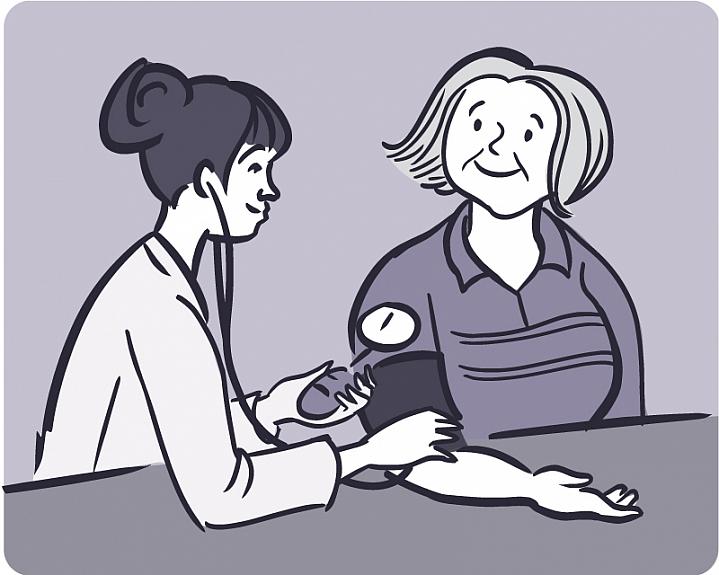- Empty cart.
- Continue Shopping
The Importance of Regular Blood Pressure Check-ups for Women

Maintaining good health is a top priority for everyone, and women, in particular, have unique healthcare needs and considerations. One crucial aspect of women’s health that often goes overlooked is monitoring blood pressure. Regular blood pressure check-ups are of utmost importance for women as they can play a significant role in preventing and managing various health issues.
Understanding Blood Pressure
Before delving into the importance of regular check-ups, let’s first understand what blood pressure is. Blood pressure is the force of blood against the walls of arteries as the heart pumps it around the body. It is measured in millimeters of mercury (mm Hg) and typically expressed as two numbers: systolic (the top number) and diastolic (the bottom number). For instance, a normal blood pressure reading is often around 120/80 mm Hg.
The Unique Health Challenges Women Face
Women experience various life stages and physiological changes that can influence blood pressure and overall health. These include:
1. Pregnancy:
Pregnancy can lead to temporary increases in blood pressure, such as gestational hypertension or preeclampsia. Monitoring blood pressure during pregnancy is crucial for both maternal and fetal health.
2. Menopause:
During menopause, hormonal changes can affect blood pressure regulation. Some women may experience increased blood pressure as a result.
3. Hormonal Contraceptives:
Certain hormonal contraceptives, such as birth control pills, can impact blood pressure. Women using these methods should have their blood pressure monitored regularly.
4. Longer Life Expectancy:
Women tend to live longer than men, which means they are more likely to experience age-related health conditions like hypertension (high blood pressure) in their later years.
The Importance of Regular Blood Pressure Check-ups
Now, let’s explore why regular blood pressure check-ups are essential for women’s health:
1. Early Detection of Hypertension:
Hypertension, or high blood pressure, is often called the “silent killer” because it may not present noticeable symptoms until it reaches advanced stages. Regular check-ups can help detect hypertension early when it is more manageable.
2. Prevention of Cardiovascular Diseases:
High blood pressure is a major risk factor for heart disease, stroke, and other cardiovascular conditions. Women with hypertension are at a higher risk of heart disease, and early detection and management can significantly reduce this risk.
3. Monitoring During Pregnancy:
Pregnant women need careful monitoring of their blood pressure to identify conditions like gestational hypertension and preeclampsia, which can be harmful to both the mother and baby.
4. Assessment of Hormonal Effects:
Regular check-ups can help healthcare providers assess the impact of hormonal changes, such as those during menopause or while using hormonal contraceptives, on blood pressure.
5. Medication Management:
If high blood pressure is detected, healthcare providers can prescribe medication or recommend lifestyle changes to control it. Regular follow-ups ensure that treatment is effective and adjustments can be made if necessary.
6. Personalized Health Plans:
Women’s health is highly individualized, and regular check-ups allow healthcare providers to create personalized health plans that consider a woman’s unique risk factors and needs.
7. Empowerment Through Education:
Regular check-ups offer opportunities for women to learn about their health, ask questions, and gain insights into how to maintain or improve their well-being.
How Often Should Women Get Their Blood Pressure Checked?
The frequency of blood pressure check-ups can vary depending on a woman’s age, medical history, and risk factors. However, as a general guideline:
- Young adults with normal blood pressure should have their blood pressure checked at least once every two years.
- Women over the age of 40, or those with risk factors like obesity, diabetes, or a family history of hypertension, should consider more frequent check-ups, such as annually or as recommended by their healthcare provider.
- Pregnant women should have their blood pressure monitored at every prenatal visit.
In Conclusion, Regular blood pressure check-ups are a vital component of women’s healthcare. By monitoring blood pressure, women can reduce their risk of serious health conditions, including heart disease, stroke, and complications during pregnancy. These check-ups empower women to take control of their health, make informed decisions, and receive timely interventions when necessary.
Remember that healthcare is a partnership between individuals and their healthcare providers. If you’re a woman, prioritize regular blood pressure check-ups and open communication with your healthcare team to ensure that you are on the path to a healthier, longer, and more fulfilling life. Your well-being is worth the effort, and early detection and management of high blood pressure can make all the difference in your overall health and longevity.








